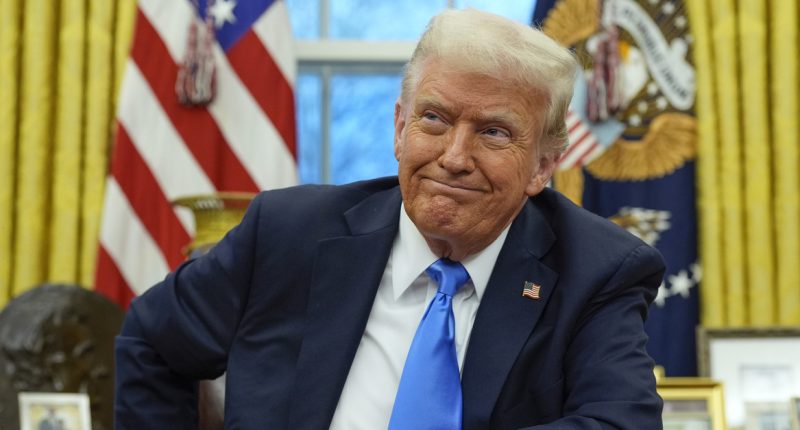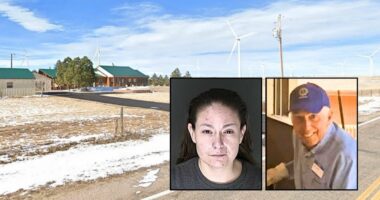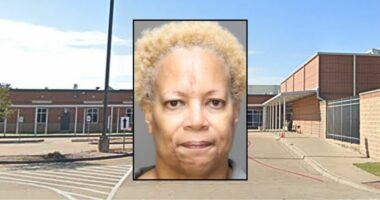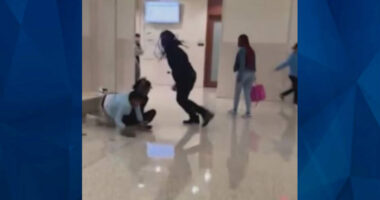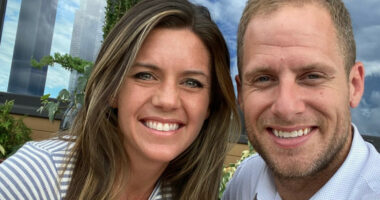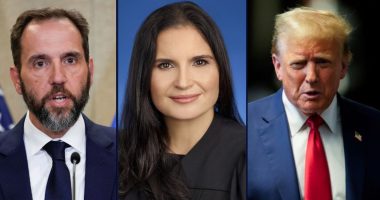Share this @internewscast.com
President Donald Trump speaks with reporters in the Oval Office at the White House, Tuesday, Feb. 11, 2025, in Washington, D.C. (Photo/Alex Brandon).
An attorney from the Department of Justice faced challenging questions and endured a difficult experience in a Washington, D.C., courtroom on Thursday as he persisted in his ongoing solo efforts to defend the Trump administration’s controversial campaign against major law firms.
Richard Lawson is the sole attorney the government has opted to deploy in court to counter lawsuits brought by law firms such as Perkins Coie, Jenner & Block, and WilmerHale.
During a two-hour motions hearing before U.S. District Judge Loren L. AliKhan regarding the Trump administration’s attempt to weaken Susman Godfrey LLP, the newly appointed deputy associate attorney general was momentarily left without words.
And it happened twice.
Love true crime? Sign up for our newsletter, The Law&Crime Docket, to get the latest real-life crime stories delivered right to your inbox.
As the court unraveled several issues in President Donald Trump‘s April 9 executive order, key sticking points during the hearing concerned an allegation that the Los Angeles-based law firm “engages in unlawful discrimination, including discrimination on the basis of race.”
During his time at the dais, Susman Godfrey’s lead attorney, Donald Verrilli, said the president’s findings were “completely baseless.”
The Joe Biden-appointed judge, for her part, repeatedly tried to ferret out what, exactly, the government had based the discrimination allegation on.
And there, Lawson was admittedly lacking.
“I don’t have the hard data on hiring,” the DOJ lawyer said at one point.
Instead, Lawson tried to defend Trump’s order by suggesting the court shift to a more nebulous but more holistic inquiry into “the quantum of proof that must exist” for the executive to determine a potential policy. To that end, Lawson argued, the answer is: “it’s low.”
In other words, the government lawyer was trying to move the debate away from specifics and into a framework where the court would be amenable to giving the president broad discretion — even, and perhaps especially, if the specifics are difficult to come by. Lawson suggested the court could sign off on a policy where the president acts based on his subjective understanding of the law firm’s commitments to diversity.
“There has to be some level of discretion afforded to the executive,” he said.
But the judge was not having it.
“I don’t know how, if you’re relying on a legally erroneous statement, you’re allowed to exercise that discretion,” AliKhan replied.
The sole statement in Trump’s order supporting the allegation is: “For example, Susman administers a program where it offers financial awards and employment opportunities only to ‘students of color.””
That line, it turns out, is a reference to the Susman Godfrey Prize, which the law firm describes as “[a]n honor awarded annually to up to 20 students of color who are finishing their first or second year at an eligible law school” and “part of the firm’s ongoing commitment to celebrate and promote diversity among civil trial lawyers.”
The government lawyer was pressed to concede that the prize is not unlawful discrimination in employment under Title VII of the Civil Rights Act, despite previous language in court filings highlighting the prize and suggesting it is unlawfully discriminatory.
“It doesn’t seem like anything you have alleged in section one constitutes unlawful racial discrimination,” AliKhan said.
The judge noted that the language regarding the prize is the only example of racial discrimination that Trump’s order contains — and that the line comes immediately after the allegation.
“I just don’t know how you square the circle,” AliKhan said.
While Lawson tried to move on to a different-but-related argument, the judge pushed him to account for the line about the prize.
“So, the only example in the executive order that has to do with racial discrimination isn’t actually an example?” the judge asked, waiting a beat before demanding an answer: “Yes or no?”
A long silence followed.
“Yes or no, sir,” the judge pressed.
More silence.
While the government lawyer did not have an answer, he finally spoke up to say as much.
“I would like to think about that, your honor,” Lawson said.
AliKhan replied: “I would like an answer before you leave my courtroom.”
The DOJ attorney then returned to the prize, initially noncommittal on whether knock-on effects of the prize might implicate Title VII but eventually conceding the point after some back-and-forth.
“So it seems like the quantum of proof is nonexistent,” the judge said, turning the attorney’s own verbiage back on him.
In the end, Lawson agreed there was no support for the racial discrimination claim in Trump’s order. Still, he insisted that some discretion should be given to the executive by the courts.
“I understand that, I just don’t understand why I’m supposed to defer to something I can’t read,” AliKhan said. “The president wrote these words and they were probably the best words.”
Another major source of conflict came with the government’s other justification for the claim that the law firm illegally discriminates.
The DOJ lawyer, moving away from the text of Trump’s order, said the real issue here is Susman Godfrey’s commitment to “racial balancing.” He then cited a portion of the law firm’s website about opportunities for “underrepresented” communities. Such language, Lawson said, assumes an “adequate representation” based on race or ethnicity and is “quite suspect” in light of the landmark U.S. Supreme Court ruling barring race-based affirmative action in college admissions.
Here, however, the judge was audibly aggrieved.
AliKhan launched into a lengthy series of questions and hypotheticals about women in law. The judge noted that women are the majority of law school graduates in the country but only make up a substantial minority of partners at law firms.
Pointedly, she asked whether language about this state of affairs, where women are statistically underrepresented, would also run afoul of the Trump administration. The government lawyer said statements alone would not be a problem.
“The concern would be true hiring,” Lawson said. “Actual hiring decisions based on hiring to hit a representative, however determined, number.”
As the discussion continued for several more minutes, the tenor and number of questions from the judge on the issue of representation suggested she viewed the government’s position unfavorably.
On rebuttal, Susman Godfrey’s attorney sought to ridicule the Trump administration’s admitted evidence as “a website statement that uses the word ‘underrepresented’ and a pledge to gender parity — that’s it.”
Then, Verrilli took a turn at rephrasing Lawson’s verbiage.
“The government may have some discretion in terms of contracting, but they don’t have discretion to violate the Constitution,” he said.
AliKhan ended the hearing by promising she would rule on both the parties’ motions for summary judgment and the plaintiff’s request for a preliminary injunction as soon as she could.
